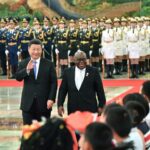Ottawa seen interfering in Hong Kong issues
Beijing and Ottawa’s relationship in the wake of Canada’s announcement to suspend its extradition treaty with Hong Kong would inevitably cast a dark shadow over those betting on improved bilateral economic ties, market watchers said.
The treaty withdrawal announcement by Canadian Prime Minister Justin Trudeau on Friday made the North American nation the first to break its law enforcement links with the Hong Kong Special Administrative Region (HKSAR).
Trudeau’s response to the newly adopted national security law for Hong Kong also included a ban on exporting sensitive military items to Hong Kong and a trade advisory update for the southern Chinese city.
The Chinese Embassy in Canada responded with a statement on its website over the weekend, saying that “Canada made unwarranted comments” on the new law and it has “grossly interfered in China’s internal affairs.”
Some countries in the West such as Canada have long been meddling in Hong Kong’s affairs under the pretext of human rights, read the statement, noting that such attempts are “doomed to fail.”
Canada’s move to curb dealings with Hong Kong is set to widen cracks already seen in Beijing-Ottawa relationship due to Canada’s arresting Huawei CFO Meng Wanzhou in late 2018, Gao Lingyun, an expert at the Chinese Academy of Social Sciences in Beijing, told the Global Times on Sunday.
A local court in Canada ruled in late May against Meng, continuing her extradition trial that is seen as detrimental to Chinese-Canadian ties.
Chinese traders who are capable of finding alternative sources for imports would certainly avoid putting all their eggs into one basket, Gao said.
Except for New Zealand, the Five Eyes intelligence alliance (a conglomeration of five nations that also includes the US, the UK, Australia, and Canada) is expected to continue to be hostile toward Beijing, necessitating increased attention from Chinese businesses that are wary of repercussions from worsening political ties, he commented.
Canadian shipments of grain and pork products to China tend to be subject to heightened tensions between Canada and its second-largest source of imports, analysts said.
Canadian barley exports to China jumped in May as China imposed antidumping duties on the grains from Australia, according to a Bloomberg report on Saturday. Canada’s barley exports to China grew 38 percent from the previous year to 175,500 tons in May, the report said, citing the Canadian Grain Commission.
“China is a very important market for Canadian producers,” the Canadian Pork Council said on its website. Canada’s pork exports to China accounted for 514 million Canadian dollars ($378.65 million) of the total number of almost 4 billion Canadian dollars in 2018, data from the council showed, making China the country’s third-largest export market.
The Canadian pork sector was on pace to double its 2018 sales last year, a target affected by a temporary suspension, according to the council. Canada’s pork shipments to China totaled 507.2 million Canadian dollars between January and November 2019.
China announced in June 2019 it would suspend all Canadian meat imports after discovering forged pork veterinary health certificates. The suspension was lifted in November.
Describing China as being of crucial significance to Canada’s economic future over the next five decades, the Canadian Agri-Food Trade Alliance said on its website that “China is, and will remain, Canada’s second-largest national two-way trade partner after the US.”
With Canadian exporters relying on the Chinese market for their business prosperity, it would be wise for Ottawa to stop being a puppet of the US, experts stressed.
“Canada could have been a beneficiary of the China-US trade tensions, given its complementary economic structure, but it chose to blindly follow the steps of the Trump administration. Canada will definitely face a harsh consequence from Beijing when China-US ties start to improve in the future,” Mei Xinyu, a research fellow at Ministry of Commerce’s Chinese Academy of International Trade and Economic Cooperation, told the Global Times.
About 100 fishing boats in Hong Kong sail on Wednesday in Victoria Harbor to celebrate the 23rd anniversary of its return to the motherland and the first day of the enforcement of the National Security Law in the city. Photo: cnsphoto



